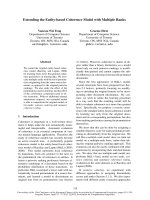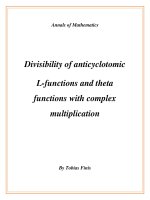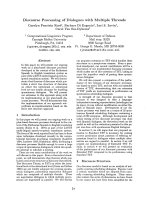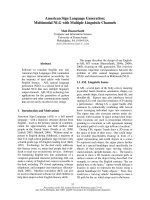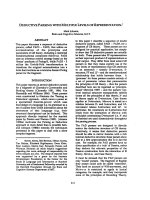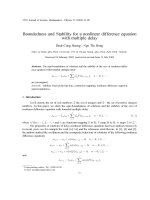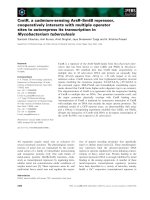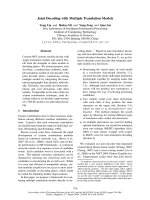Functions with multiple outputs
Bạn đang xem bản rút gọn của tài liệu. Xem và tải ngay bản đầy đủ của tài liệu tại đây (298.32 KB, 41 trang )
6.087 Lecture 5 – January 15, 2010
Review
Pointers and Memory Addresses
Physical and Virtual Memory
Addressing and Indirection
Functions with Multiple Outputs
Arrays and Pointer Arithmetic
Strings
String Utility Functions
Searching and Sorting Algorithms
Linear Search
A Simple Sort
Faster Sorting
Binary Search
1
Review: Unconditional jumps
•
goto
keyword: jump somewhere else in the same function
•
Position identified using labels
•
Example (
for
loop) using
goto
:
{
i n t i = 0 , n = 20; /
∗ i n i t i a l i z a t i o n ∗ /
goto loop_cond ;
loop_body :
/ ∗ body o f l oop here ∗ /
i ++;
loop_cond :
i f ( i < n ) /
∗ loo p c o n d i t i on ∗ /
goto loop_body ;
}
•
Excessive use of
goto
results in “spaghetti” code
1
Review: I/O Functions
•
I/O provided by stdio.h, not language itself
•
Character I/O: putchar(), getchar(), getc(),
putc(), etc.
•
String I/O: puts(), gets(), fgets(), fputs(), etc.
•
Formatted I/O: fprintf(), fscanf(), etc.
•
Open and close files: fopen(), fclose()
•
File read/write position: feof(), fseek(), ftell(), etc.
. . .
•
2
Review: printf() and scanf()
•
Formatted output:
int printf (char format [], arg1, arg2, ...)
•
Takes variable number of arguments
•
Format specification:
%[flags][width][.precision][length]<type>
•
types: d, i (int), u, o, x, X (unsigned int), e, E, f, F, g, G
(double), c (char), s (string)
•
flags, width, precision, length - modify meaning and number
of characters printed
•
Formatted input: scanf() - similar form, takes pointers to
arguments (except strings), ignores whitespace in input
3
Review: Strings and character arrays
•
Strings represented in C as an array of characters (
char []
)
•
String must be null-terminated (’\0’ at end)
Declaration:
•
char str [] = "I am a string.";
or
char str [20] = "I am a string.";
•
strcpy() - function for copying one string to another
•
More about strings and string functions today. . .
4
6.087 Lecture 5 – January 15, 2010
Review
Pointers and Memory Addresses
Physical and Virtual Memory
Addressing and Indirection
Functions with Multiple Outputs
Arrays and Pointer Arithmetic
Strings
String Utility Functions
Searching and Sorting Algorithms
Linear Search
A Simple Sort
Faster Sorting
Binary Search
5
Pointers and addresses
•
Pointer: memory address of a variable
•
Address can be used to access/modify a variable from
anywhere
•
Extremely useful, especially for data structures
•
Well known for obfuscating code
5
Physical and virtual memory
•
Physical memory: physical resources where data can be
stored and accessed by your computer
cache
•
RAM
•
hard disk
•
•
removable storage
•
Virtual memory: abstraction by OS, addressable space
accessible by your code
6
Physical memory considerations
•
Different sizes and access speeds
•
Memory management – major function of OS
•
Optimization – to ensure your code makes the best use of
physical memory available
•
OS moves around data in physical memory during
execution
•
Embedded processors – may be very limited
7
Virtual memory
•
How much physical memory do I have?
Answer: 2 MB (cache) + 2 GB (RAM) + 100 GB (hard
drive) + . . .
•
How much virtual memory do I have?
Answer: <4 GB (32-bit OS), typically 2 GB for Windows,
3-4 GB for linux
•
Virtual memory maps to different parts of physical memory
•
Usable parts of virtual memory: stack and heap
•
stack: where declared variables go
•
heap: where dynamic memory goes
8
Addressing variables
•
Every variable residing in memory has an address!
What doesn’t have an address?
•
•
register variables
•
constants/literals/preprocessor defines
•
expressions (unless result is a variable)
•
How to find an address of a variable? The & operator
i n t n = 4 ;
double p i = 3.141 59;
i n t
∗pn = &n ; / ∗ address o f i n t e g e r n ∗ /
double
∗ p pi = &p i ; / ∗ address o f double p i ∗ /
•
Address of a variable of type t has type t *
9
Dereferencing pointers
•
I have a pointer – now what?
•
Accessing/modifying addressed variable:
dereferencing/indirection operator
*
/ ∗ p r i n t s " p i = 3.141 59\n " ∗ /
p r i n t f ( "pi = %g\n" , ∗ p pi ) ;
/ ∗ p i now equals 7.14159 ∗ /
∗ p pi = ∗ p pi + ∗pn ;
•
Dereferenced pointer like any other variable
•
null pointer, i.e. 0 (NULL): pointer that does not reference
anything
10
Casting pointers
•
Can explicitly cast any pointer type to any other pointer
type
ppi = (double ∗)pn; /∗ pn originally of type ( int ∗) ∗/
•
Implicit cast to/from void
*
also possible (more next
week. . . )
•
Dereferenced pointer has new type, regardless of real type
of data
•
Possible to cause segmentation faults, other
difficult-to-identify errors
•
What happens if we dereference ppi now?
11
Functions with multiple outputs
•
Consider the Extended Euclidean algorithm
ext_euclid(a,b) function from Wednesday’s lecture
•
Returns gcd(a, b), x and y s.t. ax + by = gcd(a, b)
•
Used global variables for x and y
•
Can use pointers to pass back multiple outputs:
int ext_euclid( int a, int b, int ∗x, int ∗y);
•
Calling ext_euclid(), pass pointers to variables to
receive x and y:
i n t x , y , g ;
/ ∗ assume a , b de cla red p r e v i o u s ly ∗ /
g = e x t _ e uc l i d ( a , b,& x ,& y ) ;
•
Warning about x and y being used before initialized
12
Accessing caller’s variables
•
Want to write function to swap two integers
•
Need to modify variables in caller to swap them
•
Pointers to variables as arguments
void swap ( i n t ∗x , i n t ∗y ) {
i n t temp =
∗x ;
∗x = ∗y ;
∗y = temp ;
}
•
Calling swap() function:
i n t a = 5 , b = 7;
swap(&a , &b ) ;
/ ∗ now , a = 7 , b = 5 ∗ /
13
Variables passing out of scope
•
What is wrong with this code?
#include < s t d i o . h>
char get_message ( ) {∗
char msg [ ] = "Aren’t pointers fun?" ;
ret u rn msg ;
}
i n t main ( void ) {
char s t r i n g = get_message ( ) ;
∗
put s ( s t r i n g ) ;
ret u rn 0;
}
14


